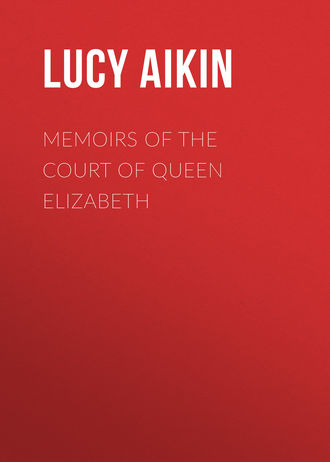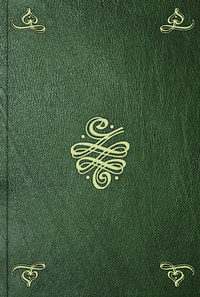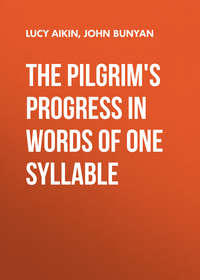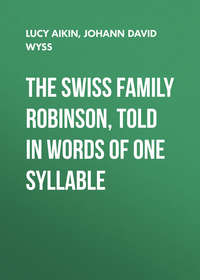 полная версия
полная версияMemoirs of the Court of Queen Elizabeth
…"At divers meetings we had divers purposes. The queen my mistress had instructed me to leave matters of gravity sometimes, and cast in merry purposes, lest otherwise she should be wearied; she being well informed of that queen's natural temper. Therefore in declaring my observations of the customs of Dutchland, Poland, and Italy; the buskins of the women was not forgot, and what country weed I thought best becoming gentlewomen. The queen said she had clothes of every sort, which every day thereafter, so long as I was there, she changed. One day she had the English weed, another the French, and another the Italian, and so forth. She asked me, which of them became her best? I answered, in my judgement the Italian dress; which answer I found pleased her well, for she delighted to show her golden coloured hair, wearing a caul and bonnet as they do in Italy. Her hair was rather reddish than yellow, curled in appearance naturally.
"She desired to know of me what colour of hair was reputed best, and whether my queen's hair or hers was best, and which of them two was fairest? I answered, the fairness of them both was not their worst faults. But she was earnest with me to declare which of them I judged fairest? I said, she was the fairest queen in England, and mine in Scotland. Yet she appeared earnest. I answered, they were both the fairest ladies in their countries; that her majesty was whiter, but my queen was very lovely. She enquired, which of them was of highest stature? I said, my queen. Then, saith she, she is too high, for I myself am neither too high nor too low. Then she asked, what exercises she used? I answered, that when I received my dispatch, the queen was lately come from the Highland hunting. That when her more serious affairs permitted, she was taken up with reading of histories: that sometimes she recreated herself in playing upon the lute and virginals. She asked if she played well? I said reasonably, for a queen."
"That same day after dinner, my lord of Hunsdon drew me up to a quiet gallery that I might hear some music, but he said he durst not avow it, where I might hear the queen play upon the virginals. After I had harkened awhile, I took by the tapestry that hung before the door of the chamber, and seeing her back was toward the door, I ventured within the chamber, and stood a pretty space hearing her play excellently well; but she left off immediately, so soon as she turned about and saw me. She appeared to be surprised to see me, and came forward, seeming to strike me with her hand, alleging that she used not to play before men, but when she was solitary, to shun melancholy. She asked how I came there? I answered, as I was walking with my lord of Hunsdon, as we passed by the chamber door, I heard such melody as ravished me, whereby I was drawn in ere I knew how, excusing my fault of homeliness as being brought up in the court of France, where such freedom was allowed; declaring myself willing to endure what kind of punishment her majesty should be pleased to inflict upon me, for so great an offence. Then she sat down low upon a cushion, and I upon my knees by her, but with her own hand she gave me a cushion to lay under my knee, which at first I refused, but she compelled me to take it. She then called for my lady Strafford out of the next chamber, for the queen was alone. She enquired whether my queen or she played best? In that I found myself obliged to give her the praise. She said my French was very good, and asked if I could speak Italian, which she spoke reasonably well. I told her majesty I had no time to learn the language, not having been above two months in Italy. Then she spake to me in Dutch, which was not good; and would know what kind of books I most delighted in, whether theology, history, or love matters? I said I liked well of all the sorts. Here I took occasion to press earnestly my dispatch: she said I was sooner weary of her company than she was of mine. I told her majesty, that though I had no reason of being weary, I knew my mistress her affairs called me home; yet I was stayed two days longer, that I might see her dance, as I was afterward informed. Which being over, she enquired of me whether she or my queen danced best? I answered, the queen danced not so high or disposedly as she did. Then again she wished that she might see the queen at some convenient place of meeting. I offered to convey her secretly to Scotland by post, cloathed like a page, that under this disguise she might see the queen, as James V. had gone in disguise with his own ambassador to see the duke of Vendome's sister, who should have been his wife. Telling her that her chamber might be kept in her absence, as though she were sick; that none need be privy thereto except lady Strafford, and one of the grooms of her chamber. She appeared to like that kind of language, only answered it with a sigh, saying, Alas, if I might do it thus!"
Respecting Leicester, Melvil says, that he was conveyed by him in his barge from Hampton Court to London, and that, by the way, he inquired of him what the queen of Scots thought of him and of the marriage proposed by Randolph. "Whereunto," says he, "I answered very coldly, as I had been by my queen commanded." Then he began to purge himself of so proud a pretence as to marry so great a queen, declaring that he did not esteem himself worthy to wipe her shoes, and that the invention of that proposition of marriage proceeded from Mr. Cecil, his secret enemy: "For if I," said he, "should have appeared desirous of that marriage, I should have offended both the queens, and lost their favor54."
If we are to receive as sincere this declaration of his sentiments by Leicester,—confessedly one of the deepest dissemblers of the age,—what a curious view does it afford of the windings and intricacies of the character of Elizabeth, of the tissue of ingenious snares which she delighted to weave around the foot-steps even of the man whom she most favored, loved, and trusted! Perhaps she encouraged, if she did not originally devise, this matrimonial project purely as a romantic trial of his attachment to herself, and pleased her fancy with the idea of his rejecting for her a younger and a fairer queen;—perhaps she entertained a transient thought of making him her own husband, and wished previously to give him consequence by this proposal;—perhaps she meant nothing more than to perplex Mary by a variety of suitors, and thus delay her marriage; an event which she could not anticipate without vexation.
That she was not sincere in her recommendation of Leicester is certain from the circumstance, that when the queen of Scots, appearing to incline to a speedy conclusion of the business, pressed to know on what conditions Elizabeth would give her approbation to the union, the earnestness in the cause which she had before displayed immediately abated.
Her conduct with respect to Darnley is equally involved in perplexity and double-dealing. Melvil, as we have seen, asserts that it was Elizabeth herself who first mentioned him as a suitable match for the queen of Scots: and if his relation be correct, which his partiality towards his own sovereign makes indeed somewhat doubtful, the English princess must have been well aware, when she conversed with him, of the favor with which the addresses of this young nobleman were likely to be received, though the envoy says that he forbore openly to express the sentiments of his court on this topic. It was after Melvil's departure that Elizabeth, not indeed without reluctance and hesitation, permitted Darnley to accompany the earl his father into Scotland, ostensibly for the purpose of witnessing the reversal of the attainder formerly passed against him, and his solemn restoration in blood; but really, as she must well have known, with the object of pushing his suit with the queen.
Mary no sooner beheld the handsome youth than she was seized with a passion for him, which she determined to gratify: but apprehensive, with reason, of the interference of Elizabeth, she disguised for the present her inclinations, and engaged with a feigned earnestness in negotiations preparatory to an union with Leicester. Meanwhile she was secretly soliciting at Rome the necessary dispensation for marrying within the prohibited degrees of the church; and it was not till the arrival of this instrument was speedily expected, and all her other preparations were complete, that, taking off the mask, she requested her good sister's approbation of her approaching nuptials with lord Darnley.
It is scarcely credible that a person of Elizabeth's sagacity, with her means of gaining intelligence and after all that had passed, could have been surprised by this notification of the intentions of the queen of Scots, and it is even problematical how far she was really displeased at the occurrence. Except by imitating her perpetual celibacy,—a compliment to her envy and her example which could not in reason be expected,—it might seem impossible for the queen of Scots better to consult the views and wishes of her kinswoman than by uniting herself to Darnley;—a subject, and an English subject, a near relation both of her own and Elizabeth's, and a man on whom nature had bestowed not a single quality calculated to render him either formidable or respectable. The queen of England, however, frowardly bent on opposing the match to the utmost, directed sir Nicholas Throgmorton, her ambassador, to set before the eyes of Mary a long array of objections and impediments; and he was further authorized secretly to promise support to such of the Scottish nobles as would undertake to oppose it. She ordered, in the most imperious terms, the earl of Lenox and his son to return immediately into England; threw the countess of Lenox into the Tower by way of intimidation; and caused her privy-council to exercise their ingenuity in discovering the manifold inconveniences and dangers likely to arise to herself and to her country from the alliance of the queen of Scots with a house so nearly connected with the English crown.
Mary, however, persisted in accomplishing the union on which her mind was set: Darnley and his father neglected Elizabeth's order of recall; and her privy-council vexed her by drawing from the melancholy forebodings which she had urged them to promulgate two unwelcome inferences;—that the queen ought to lose no time in forming a connexion which might cut off the hopes of others by giving to the nation posterity of her own;—and that as the Lenox family were known papists, it would now be expedient to exercise against all of that persuasion the utmost severity of the penal laws. The earl of Murray and some other malcontent lords in Scotland were the only persons who entered with warmth and sincerity into the measures of Elizabeth against the marriage; for they alone had any personal interest in impeding the advancement of the Lenox family. Rashly relying on the assurances which they had received of aid from England, they took up arms against their sovereign; but finding no support from any quarter, they were soon compelled to make their escape across the border and seek refuge with the earl of Bedford, lord warden of the marches. On their arrival in London, the royal dissembler insisted on their declaring, in presence of the French and Spanish ambassadors, that their rebellious attempts had received no encouragement from her; but after this open disavowal, she permitted them to remain unmolested in her dominions, secretly supplying them with money and interceding with their offended sovereign in their behalf.
Melvil acquaints us that when sir Nicholas Throgmorton, on returning from his embassy, found that the promises which he had made to these malcontents had been disclaimed both by her majesty and by Randolph, he "stood in awe neither of queen nor council to declare the verity, that he had made such promises in her name, whereof the councillors and craftiest courtiers thought strange, and were resolving to punish him for avowing the same promise to be made in his mistress' name, had not he wisely and circumspectly obtained an act of council for his warrant, which he offered to produce. And the said sir Nicholas was so angry that he had been made an instrument to deceive the said banished lords, that he advised them to sue humbly for pardon at their own queen's hand, and to engage never again to offend her for satisfaction of any prince alive. And because, as they were then stated, they had no interest, he penned for them a persuasive letter and sent to her majesty." On this occasion Throgmorton showed himself a warm friend to Mary's succession in England, and advised clemency to the banished lords as one mean to secure it. Mary, highly esteeming him and convinced by his reasons, resolved to follow his counsels.
Elizabeth never willingly remitted any thing of that rigor against the puritans which she loved to believe it politic to exercise; but they were fortunate enough to find an almost avowed patron in Leicester, and secret favorers in several of her ministers and counsellors; and during the persecutions of the catholics which followed the marriage of Mary, she was compelled to press upon them with a less heavy hand.
Archbishop Parker, who was proceeding with much self-satisfaction and success in the task of silencing by the pains of suspension and deprivation all scruples of conscience among the clergy respecting habits and ceremonies, was now mortified to find his zeal restrained by the interference of the queen herself, while the exulting puritans studied to improve to the utmost the temporary connivance of the ruling powers.
CHAPTER XIV
1565 AND 1566Renewal of the archduke's proposal.—Disappointment of Leicester.—Anecdote concerning him.—Disgrace of the earl of Arundel.—Situation of the duke of Norfolk.—Leicester his secret enemy.—Notice of the earl of Sussex.—Proclamation respecting fencing schools.—Marriage of lady Mary Grey.—Sir H. Sidney deputy of Ireland.—Queen's letter to him.—Prince of Scotland born.—Melvil sent with the news to Elizabeth.—His account of his reception.—Motion in the house of commons for naming a successor.—Discord between the house and the queen on this ground.—She refuses a subsidy—dissolves parliament—visits Oxford.—Particulars of her reception.
Whether or not it was with a view of impeding the marriage of the queen of Scots that Elizabeth had originally encouraged the renewal of the proposals of the archduke to herself, certain it is that the treaty was still carried on, and even with increased earnestness, long after this motive had ceased to operate.
It was subsequently to Mary's announcement of her approaching nuptials, that to the instances of the imperial ambassador Elizabeth had replied, that she desired to keep herself free till she had finally decided on the answer to be given to the king of France, who had also offered her his hand55. After breaking off this negotiation with Charles IX., she declared to the same ambassador, that she would never engage to marry a person whom she had not seen;—an answer which seemed to hint to the archduke that a visit would be well received. It was accordingly reported with confidence that this prince would soon commence his journey to England; and Cecil himself ventured to write to a friend, that if he would accede to the national religion, and if his person proved acceptable to her majesty, "except God should please to continue his displeasure against us, we should see some success." But he thought that the archduke would never explain himself on religion to any one except the queen, and not to her until he should see hopes of speeding.
The splendid dream of Leicester's ambition was dissipated for ever by these negotiations; and a diminution of the queen's partiality towards him, distinctly visible to the observant eyes of her courtiers, either preceded or accompanied her entertaining so long, and with such an air of serious deliberation, the proposals of a foreign prince. The enemies of Leicester,—a large and formidable party, comprehending almost all the highest names among the nobility and the greater part of the ministers,—openly and zealously espoused the interest of the archduke. Leicester at first with equal warmth and equal openness opposed his pretensions; but he was soon admonished by the frowns of his royal mistress, that if he would preserve or recover his influence, he must now be content to take a humbler tone, and disguise a disappointment which there was arrogance in avowing.
The disposition of Elizabeth partook so much more of the haughty than the tender, that the slightest appearances of presumption would always provoke her to take a pleasure in mortifying the most distinguished of her favorites; and it might be no improbable guess, that almost the whole of the encouragement given by her to the addresses of the archduke was prompted by the desire of humbling the pride of Leicester, and showing him that his ascendency over her was not so complete or so secure as he imagined.
A circumstance is related which we may conjecture to have occurred about this time, and which sets in a strong light this part of the character of Elizabeth. "Bowyer, a gentleman of the Black Rod, being charged by her express command to look precisely into all admissions into the privy-chamber, one day stayed a very gay captain, and a follower of my lord of Leicester's, from entrance; for that he was neither well known, nor a sworn servant to the queen: at which repulse, the gentleman, bearing high on my lord's favor, told him, he might perchance procure him a discharge. Leicester coming into the contestation, said publicly (which was none of his wont) that he was a knave, and should not continue long in his office; and so turning about to go in to the queen, Bowyer, who was a bold gentleman and well beloved, stepped before him and fell at her majesty's feet, related the story, and humbly craves her grace's pleasure; and whether my lord of Leicester was king, or her majesty queen? Whereunto she replied with her wonted oath, 'God's death, my lord, I have wished you well; but my favor is not so locked up for you, that others shall not partake thereof; for I have many servants, to whom I have, and will at my pleasure, bequeath my favor, and likewise resume the same: and if you think to rule here, I will take a course to see you forthcoming. I will have here but one mistress, and no master; and look that no ill happen to him, lest it be required at your hands.' Which words so quelled my lord of Leicester, that his feigned humility was long after one of his best virtues56."
It might be some consolation to Leicester, under his own mortifications, to behold his ancient rival the earl of Arundel subjected to far severer ones. This nobleman had resigned in disgust his office of lord-chamberlain; subsequently, the queen, on some ground of displeasure now unknown, had commanded him to confine himself to his own house; and at the end of several months passed under this kind of restraint, she still denied him for a further term the consolation and privilege of approaching her royal presence.
Disgraces so public and so lasting determined him to throw up the desperate game on which he had hazarded so deep a stake: he obtained leave to travel, and hastened to conceal or forget in foreign lands the bitterness of his disappointment and the embarrassment of his circumstances.
It is probable that from this time Elizabeth found no more serious suitors amongst her courtiers, though they flattered her by continuing, almost to the end of her life, to address her in the language of love, or rather of gallantry. With all her coquetry, her head was clear, her passions were cool; and men began to perceive that there was little chance of prevailing with her to gratify her heart or her fancy at the expense of that independence on which her lofty temper led her to set so high a value. Some were still uncharitable, unjust enough to believe that Leicester was, or had been, a fortunate lover; but few now expected to see him her husband, and none found encouragement sufficient to renew the experiment in which he had failed. Notwithstanding her short and capricious fits of pride and anger, it was manifest that Leicester still exercised over her mind an influence superior on the whole to that of any other person; and the high distinction with which she continued to treat him, both in public and private, alarmed the jealousy and provoked the hostility of all who thought themselves entitled by rank, by relationship, or by merit, to a larger share of her esteem and favor, or a more intimate participation in her councils.
One nobleman there was, who had peculiar pretensions to supersede Leicester in his popular appellation of "Heart of the Court," and on whom he had already fixed in secret the watchful eye of a rival. This was Thomas duke of Norfolk. Inheriting through several channels the blood of the Plantagenets,—nearly related to the queen by her maternal ancestry, and connected by descent or alliance with the whole body of the ancient nobility; endeared also to the people by many shining qualities, and still more by his unfeigned zeal for reformed religion,—his grace stood first amongst the peers of England, not in degree alone or in wealth, but in power, in influence, and in public estimation.
He was in the prime of manhood and lately a widower; and when, in the parliament of 1566, certain members did not scruple to maintain that the queen ought to be compelled to marry for the good of her country, the duke was named by some, as the earl of Pembroke was by others and the earl of Leicester by a third party, as the person whom she ought to accept as a husband. It does not however appear that the duke himself had aspired, openly at least, to these august but unattainable nuptials.
Elizabeth seems to have entertained for him at this period a real regard: he could be to her no object of distrust or danger, and the example which she was ever careful to set of a scrupulous observance of the gradations of rank, led her on all occasions to prefer him to the post of honor. Thus, after the peace with France in 1564, when Charles IX. in return for the Garter, which the queen of England had sent him, offered to confer the order of St. Michael on two English nobles of her appointment, she named without hesitation the duke of Norfolk and the earl of Leicester.
The arrogance of Dudley seldom escaped from the control of policy; and as he had the sagacity to perceive that the duke was a competitor over whom treachery alone could render him finally triumphant, he cautiously avoided with him any open collision of interests, any offensive rivalry in matters of place and dignity. He even went further; he compelled himself, by a feigned deference, to administer food to that exaggerated self-consequence,—the cherished foible of the house of Howard in general and of this duke in particular,—out of which he perhaps already hoped that matter would arise to work his ruin. The chronicles of the year 1565 give a striking instance of this part of his behaviour, in the information, that the duke of Norfolk, going to keep his Christmas in his own county, was attended out of London by the earls of Leicester and Warwick, the lord-chamberlain and other lords and gentlemen, who brought him on his journey, "doing him all the honor in their power."
The duke was not gifted with any great degree of penetration, and the generosity of his disposition combined with his vanity to render him generally the dupe of outward homage and fair professions. He repaid the insidious complaisance of Leicester with good will and even with confidence; and it was not till all was lost that he appears to have recognised this fatal and irreparable error.
Thomas earl of Sussex was an antagonist of a different nature,—an enemy rather than a rival,—and one who sought the overthrow of Leicester with as much zeal and industry as Leicester himself sought his, or that of the duke; but by means as open and courageous as those of his opponent were ever secret, base, and cowardly. This nobleman, the third earl of the surname of Radcliffe, and son of him who had interfered with effect to procure more humane and respectful treatment of Elizabeth during the period of her adversity, had been first known by the title of lord Fitzwalter, which he derived from a powerful line of barons well known in English history from the days of Henry I. By his mother, a daughter of Thomas second duke of Norfolk, he was first-cousin to queen Anne Boleyn; and friendship, still more than the ties of blood, closely connected him with the head of the Howards. Several circumstances render it probable that he was not a zealous protestant, though it is no where hinted that he was even secretly attached to the catholic party. During the reign of Mary, his high character and approved loyalty had caused him to be employed, first in an embassy to the emperor Charles V. to settle the queen's marriage-articles; and afterwards in the arduous post of lord-deputy of Ireland. Elizabeth continued him for some time in this situation; but wishing to avail herself of his counsels and service at home, she recalled him in 1565, conferred upon him the high dignity of lord-chamberlain, vacant by the resignation of the earl of Arundel, and appointed as his successor in Ireland his excellent second in office sir Henry Sidney, who stood in the same relation, that of brother-in-law, to Sussex and to Leicester, and whose singular merit and good fortune it was to preserve to the end the esteem and friendship of both.





